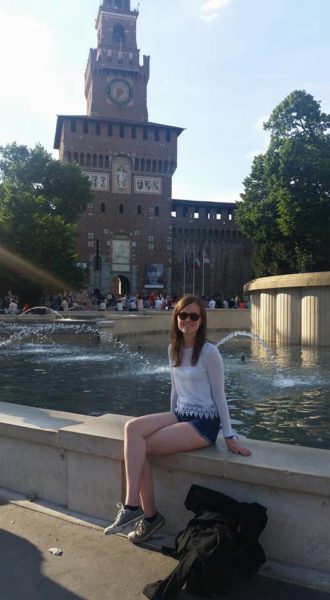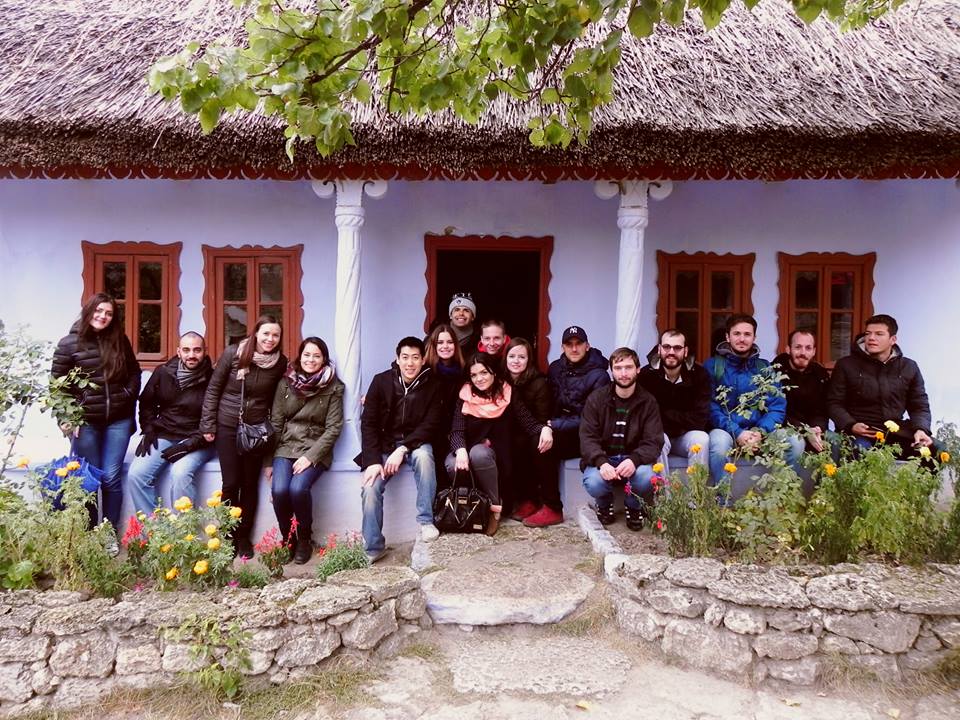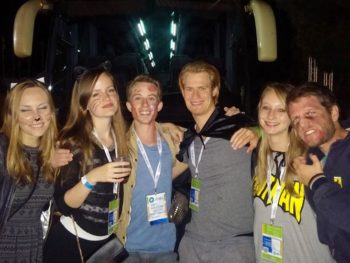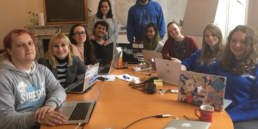One of the three candidates for the Juridical Commission (JC) is Lisette Kunst, a 24-year old law student from AEGEE-Groningen. She has been a member of the Mediation Commission for the term between Agora Kyïv and Agora Chisinau, and, after a term as subcommissioner of the JC, she is ready to be part of it. We asked her some questions to get to know her and her candidature better right before the Agora.
 Erika Bettin: Can you please introduce yourself, your life in and out AEGEE, your passions?
Erika Bettin: Can you please introduce yourself, your life in and out AEGEE, your passions?
Lisette Kunst: I am Lisette, and I’m a 24-year old law student from Groningen. I have been an active member of my local for almost five years, and have organized hitchhiking competitions, a NWM, and a pre-event for Agora Enschede for my local. On the European level, I have been a member of the Mediation Commission for the term between Agora Kyïv and Agora Chisinau, and attended several Agorae and other European events. Besides my AEGEE life I have a general passion for travelling just about anywhere, like horse riding and playing tennis, trying out new recipes, and spending time with my friends.
Why do you want to run for the Juridical Commission? What are the relevant experiences you can bring to the table?
I am running for the Juridical Commission because I enjoyed my work as a subcommissioner, and would like to learn, and do more for AEGEE. Besides this, I think it would be a good learning experience to have the chance to apply my legal skills to the diverse kinds of questions JC is faced with. Relevant experiences I can bring to the table are first of all my studies. I study Dutch law, with a special focus on EU and international law. Besides having experience working with law-related issues in my studies, I have been in my local JC for almost three years now. Although this is much less complicated than European level advising seems to be so far, it has given me at least some experience in an advisory role by, for instance, having to figure out how to improve proposals for changes in the internal regulations of our local in a way that best suits the objectives of the proposers and conforms to the rest of our internal regulations and statutes. Another experience I think is relevant has been my work in the Mediation Commission, where I got experience with working on the European level of AEGEE, and on which I will elaborate more later. Lastly, I have been a subcommissioner for JC since September. Although I still have some learning to do, this experience will be useful because I have seen how JC is working internally, what kinds of questions and issues come up, and assisted them in their tasks, so that I have realistic expectations of the kind of work I will do.
Following the proposal that establish that the member of the Juridical commission that joins Mediation Commission will be appointed within the team, given your experience, do you think you are the most indicated to do the task?
Even though I think I would be a suitable person for the task and know what to expect in terms of things you have to deal with in the Mediation Commission, I don’t think this earlier experience necessarily makes me the most indicated for it. This is because I will still need a knowledge transfer, as some things in the way they work might have changed after my term ended, the cases and DPPS implementation related issues they are working on will be different, and their expectations of me as part of the Mediation Commission on behalf of JC may be different than what I was used to. That being said, depending on the preference of the Mediation Commission itself and the way we, if elected, will divide our tasks, I would be very happy to be part of the Mediation Commission again.
 According to you, will your experience as member of the Mediation Commission be helpful in JC? And why?
According to you, will your experience as member of the Mediation Commission be helpful in JC? And why?
My experience in the Mediation Commission has been valuable in multiple ways. First of all, it has been a very rewarding and motivating experience, which has contributed significantly to my decision to apply for JC. Besides this, I expect that this experience will be helpful towards the actual work we do in JC because it gave me an inside view of what working on the European level is like, in the sense of showing the internal structures of AEGEE, as well as the fun and challenges in international, long-distance, teamwork. Challenges in the sense of, for example, that your perspectives are all different because of your different backgrounds, and having to work together closely while living far apart. Last, it was a good exercise in learning to see all sides to a debate, seek compromises and reconcile different perspectives on issues to be able to find the best solutions.
You said that you want to restructure the training of the JC and to make them more involved. You are currently a subcommissioner. What is your experience regarding this and how would you structure the work of your subcommissioners?
Already saying I would like to restructure things is a bit too much – I would like to review the way JC is currently working with its subcommissioners. This is because there are a few things I think might have been nice to know more of, or already have experience with before candidating, such as the work they do on the proposals. To me, reviewing the way of working with the subcommissioners would entail examining why things are as they are now. If these decisions were made because some things will feature enough in the KT to compensate, or because it wasn’t possible to do more because of the workload, then obviously the way of working with subcommissioners isn’t the thing that needs to change. However, if it turns out things can be improved, I would like to take steps to do so.

The work of the Juridical Commission hits its pike right before the Agora when proposals are presented. Did you collaborate already as subcommissioner in the submission process? How would you deal with proposers and proposal, but also with time since many times people submit last minute?
As a subcommissioner, I wasn’t involved in the submission process, or anything else concerning proposals, so I can’t give as detailed an answer as I would like. Generally speaking, I’d probably make sure to save some more of my free time for JC around the deadlines, try to make sure to give clear and useful advice as early on in the procedure as possible, and obviously would make sure the procedural rules for the proposals are respected.
In your candidature, as well as Veronika’s, you are speaking about JC database and the challenge in having all the statutes. Can you elaborate a bit and tell us what are your ideas in improving the situation?
This year’s JC has started to more actively collect all the statutes from locals. As it is an obligation for locals to submit their statutes to JC upon changing them, and having CIA compliant statutes in general, I think it is a logical decision to create a database that allows an overview of the statutes. JC is collaborating on it with the Network Commission, who, being closest to the locals, can help us out there. I would obviously like to continue the collection and subsequent improvements of local statutes during my term. In doing so I would like to take an active approach, directly writing to boards rather than just using mass mailers, try to work with locals in a constructive way, being clear on what we ask of them and why, and being available, constructive and approachable in case there are any issues, or they need help.
 You said that you want to continue the work and the team spirit of the previous commission. What would you like to keep? And what would you like to change/improve?
You said that you want to continue the work and the team spirit of the previous commission. What would you like to keep? And what would you like to change/improve?
To me, the way of working as a team is incredibly important, not just because good teamwork improves the accuracy and efficiency of the work, but also because I think working in JC itself becomes a more rewarding experience for everyone if you can work in a team you get along with well. Any ideas I would have for continuing the work and team spirit of the current Commission are probably not really radical ideas, or real changes from how the current JC did their teambuilding. The current JC seems to work together really well, and a working relationship like the one they have is what I would like the new team to strive for. It would be too early to say what I’d want to change, because every team is different and has different needs in terms of building team and working spirit; some groups need to work on this more than others depending on how they get along from a starting point. So some things will probably be different from how the previous JC did it, but it’s too early to say exactly what, because it heavily depends on what we think we would need to work well as a team, and obviously also on the preferences of the other candidates.
Why should people vote for you?
Because I’m very motivated to be part of JC, and want to do a good job at anything I do. In this case I want to learn a lot, and be able to use the skills I have and will acquire to make a real contribution to the work of AEGEE.
You can read her full candidature here.
Check also the interviews with the other two candidates for Juridical Commission: Giuseppe Aquilino, AEGEE-Catania, and Veronika Chmelárová, AEGEE-Berlin


